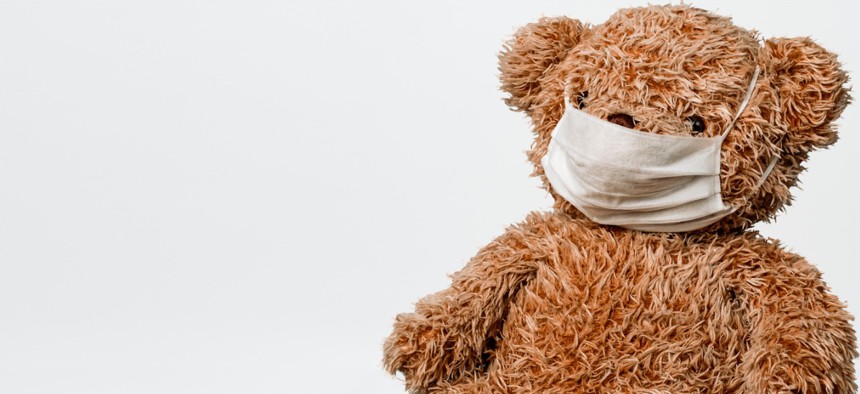What’s Safe for Kids Now?

Anastasiia Makarevich/iStock.com
Parents need to hear from the CDC.
Parents of young children have some pressing questions for the CDC.
In recent guidance, the public-health agency suggested that fully vaccinated individuals can burn their masks and never wear a face covering again. (I’m exaggerating. Masks are still required on public transit and in medical facilities, among other places.) Meanwhile, unvaccinated people should continue to mask inside as well as at crowded outdoor venues. The sound scientific basis for these recommendations is that the vaccines are excellent, work well against the new variants, and seem to protect against even asymptomatic disease and transmission. Vaccinated people are quite safe from COVID-19, the odd breakthrough case notwithstanding. Many states have accordingly dropped their mandates. You can now shop unmasked in the Providence, Rhode Island, Whole Foods near where I live (though practically no one does).
[Dana Stevens: Excuse me if I’m not ready to unmask]
The country has no system of vaccine passports or tattoos, so Americans are on the honor system about their status. The CDC has acknowledged that, sure, some unvaccinated people will cheat and not mask, but indicated that this behavior is a threat only to other unvaccinated people. The underlying implication of the CDC’s stance is that if you’re worried about cheaters, you should get vaccinated.
This supposed solution has created a tremendous sense of frustration for parents of kids under 12, who cannot be vaccinated yet. Please, CDC, help us. What should we do?
The general questions parents need answered are: Should we apply CDC guidance, presumably intended for unvaccinated adults, to our unvaccinated children? Or do children belong in a different category? And what about very young children who cannot or will not wear masks? Can they participate in society, or must we keep them locked inside?
Here’s one specific question: If you see your extended family this summer, and all the adults are vaccinated but the kids are not, do the kids need to mask the whole time? And here’s another, very basic: Can an 18-month-old go to a playground, given that health authorities do not recommend wearing a mask at such a young age?
The CDC has issued some guidance for specific contexts—schools and camps—but the strictness of that guidance only adds to the confusion. On the topic of summer camps, the CDC has said that children and adults should wear masks at all times other than when eating, swimming, or sleeping, including during vigorous outdoor exercise, even when counselors have been vaccinated. This advice seems extreme given what we know about outdoor transmission (a rare occurrence, to say the least). Even Anthony Fauci, when asked about the camp guidance, called it “a bit strict.” He also chuckled. Chuckled.
If this is what it takes to keep kids safe, according to the CDC, does that mean parents shouldn’t bring their children to Whole Foods with possibly unvaccinated, unmasked people around? Meanwhile, a number of governors have relaxed mask rules in schools, leaving some parents elated and others terrified. Should people pull their children out of the classroom if masks are not required?
The CDC needs to give anxious parents more clarity. And because vaccines are now readily available to adults, I would encourage the CDC to start talking about kids, with a focus on the risk to kids.
Throughout the pandemic, health authorities have noted that most kids are at low risk of serious illness. But they have argued nevertheless that all kids need to take precautions to protect adults. Not to put too fine a point on it, but we have burdened our children for the sake of our society, and particularly the oldest members of our society. Now that the great majority of adults can protect themselves through vaccination, this burden no longer makes sense.
[Derek Thompson: The CDC’s new mask guidelines came out of nowhere]
The CDC should shift to child-centric advice, and it should help parents understand the risk of COVID-19 to children by comparing it to other, more familiar dangers. For example, how should parents think about the current situation relative to going out with their child during a typical flu season? Any advice here should also take into account the risk to kids from remaining isolated: mental-health costs, other physical health risks, loss of learning, and so on. And this advice should ideally be framed to help parents make their own decisions, factoring in any specific health issues facing their children or their family, and their own risk tolerance. Not every parent will make the same choice, but they need help making the ones that are right for them.
Many parents worry that we’ve put kids last. This may have been the right choice, but it isn’t anymore. We need to figure out how we can make it up to them. And the CDC can help by providing more guidance to parents.
This article was originally published in The Atlantic. Sign up for its newsletter.





